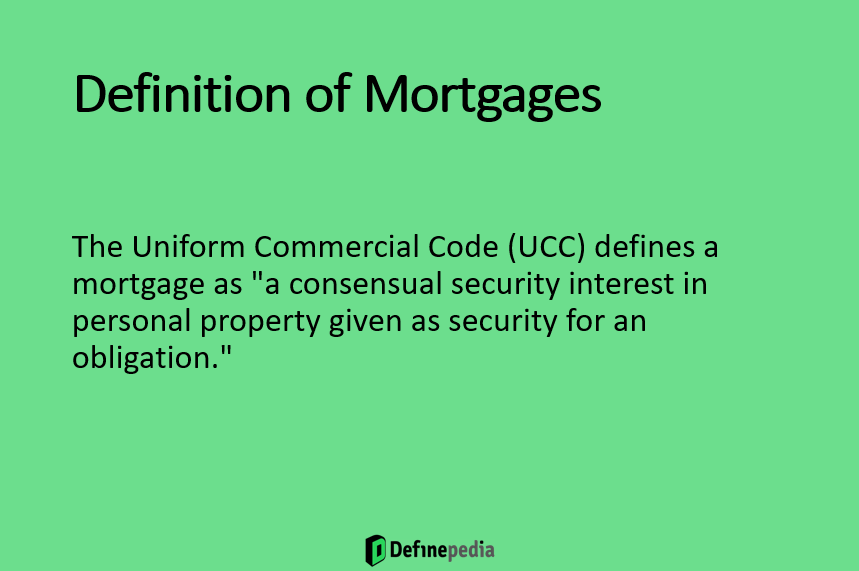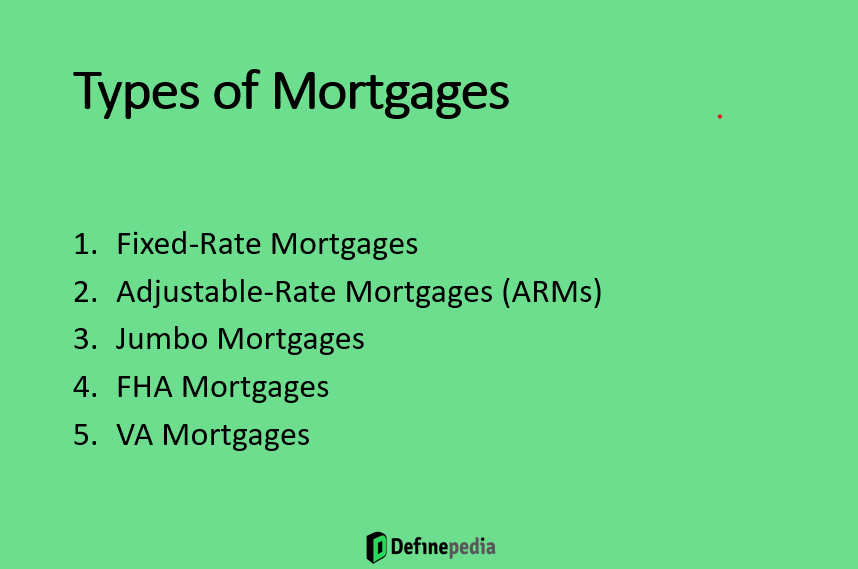Introduction
The money magic that lets you turn your dream home into a reality. Ever wondered how people afford those beautiful houses without a bag full of gold coins? Well, it’s all about mortgages! So, belt up, because by the end of this, you’ll be the mortgage genius your friends.
What is a Mortgage?
Okay, imagine you’ve found your dream home, but it’s like buying a house – a bit expensive. Here’s where a mortgage comes in. A mortgage is like a friendly loan from a bank or a lender that helps you buy that house, oops, I mean, house! They lend you the money, and you promise to pay it back over time.
Why Get a Mortgage?
Why get a mortgage, you ask? Well, unless you have a magic money tree in your backyard, mortgages are your golden ticket to home ownership. They let you break down the massive cost of a house into manageable parts over the years. Instead of eating just one huge pizza, you get to enjoy slices over time! Plus, it’s a chance to show off your self-sufficiency skills.
Definition of a Mortgage

In simple words, a mortgage is a legal promise you make to a lender, saying, “Hey, I really want this house, but I need your help. I’ll pay you back, cross my heart!” Think of it as a pinky swear with legal paperwork.
The Uniform Commercial Code (UCC) defines a mortgage as “a consensual security interest in personal property given as security for an obligation.”
The Federal Housing Administration (FHA) defines a mortgage as “a loan secured by real estate.”
The Department of Veterans Affairs (VA) defines a mortgage as “a loan guaranteed by the VA that is secured by real estate.”
Legal Definition of a Mortgage
Now, legally, a mortgage isn’t just a promise. It’s a proper legal agreement that says, “I give you the house as a backup until I pay off the money I owe you.” So, if you ever forget to pay, they won’t just send a reminder – they might knock on your door with the moving truck!
Characteristics of a Mortgage
Mortgages come with some cool features, like adjustable seats in a fancy car. First, there’s the principal amount – that’s the money you borrowed. Then, there’s the interest, which is like the ticket price you pay for borrowing the money. And guess what? You can choose how fast you want to pay it off – it’s like deciding whether to eat your ice cream cone in 5 minutes or savour it over 20!
- Principal: The principal is the amount of money that you borrow from the lender. It is the amount that you will eventually pay back, plus interest.
- Interest: Interest is the fee that you pay to the lender for borrowing the money. It is calculated as a percentage of the principal amount, and it is paid over the life of the loan.
- Term: The term is the length of time that you have to repay the loan. Mortgages typically have terms of 15 or 30 years.
- APR: The APR (annual percentage rate) is the total cost of the loan expressed as a yearly percentage. It includes the principal, interest, and any other fees associated with the loan.
Different Types of Mortgages

Now, hold on tight, because here comes the exciting part – different types of mortgages! It’s like choosing the flavor of your ice cream, but each flavor has its own special twist.
- Fixed-Rate Mortgages
- Adjustable-Rate Mortgages (ARMs)
- Jumbo Mortgages
- FHA Mortgages
- VA Mortgages
Fixed-Rate Mortgages
Imagine having a friend who’s super consistent – that’s a fixed-rate mortgage. The interest rate stays the same throughout the entire mortgage. So, if you get a 4% interest rate, it’s like having a forever coupon that never expires.
Adjustable-Rate Mortgages (ARMs)
Think of ARMs as the adventurous cousins of fixed-rate mortgages. The interest rate starts low, like a friendly wave from a roller coaster, but it can change over time. It’s like riding a roller coaster with unexpected twists – thrilling but with a hint of surprise.
Jumbo Mortgages
Jumbo mortgages are like ordering the super-sized meal – they’re for those house mansions that are way pricier than average homes. So, if you’re eyeing a castle with a moat, a jumbo mortgage might be your ticket to royalty.
FHA Mortgages
FHA mortgages are like the superhero sidekick of mortgages. They’re backed by the government and help people with lower credit scores or less cash for a down payment to join the homeowners’ league. It’s like getting a super boost to achieve your homeownership dreams.
VA Mortgages
Calling all the heroes who’ve served in the military! VA mortgages are your salute to homeownership. They come with special perks like lower interest rates and no down payment. It’s like the home loan equivalent of a medal for your service.
How to Choose the Right Mortgage
- Consider your financial situation. What is your income? What are your debts? How much money can you afford to put down? These factors will all affect the type of mortgage that you qualify for and the terms that you can get.
- Think about your long-term goals. Do you want to stay in your home for a long time? Or are you planning to move in a few years? If you’re planning to stay in your home for a long time, a fixed-rate mortgage may be a good option. If you’re planning to move in a few years, an adjustable-rate mortgage may be a better choice.
- Shop around and compare rates. There are many different lenders out there, so it’s important to shop around and compare rates before you choose a mortgage. You can use online resources like Bankrate or NerdWallet to compare rates from different lenders.
- Get pre-approved for a mortgage. Getting pre-approved for a mortgage will give you an idea of how much you can afford to borrow. It will also show sellers that you’re a serious buyer.
- Work with a qualified mortgage broker. A mortgage broker can help you find the right mortgage for your needs and budget. They can also negotiate with lenders on your behalf to get you the best possible rate.
- Don’t be afraid to ask questions. If you don’t understand something about a mortgage, don’t be afraid to ask your lender or mortgage broker to explain it to you.
- Read the fine print. Before you sign any paperwork, be sure to read the fine print and understand all of the terms of the mortgage.
Get everything in writing. Once you’ve agreed to the terms of a mortgage, be sure to get everything in writing. This will help to avoid any misunderstandings down the road.
Factors to Consider
Think about how long you plan to stay in the house, your budget, and how comfortable you are with risks. It’s like deciding whether to take the daring roller coaster or stick to the gentle merry-go-round.
- Your financial situation: This includes your income, debts, and credit score. Lenders will look at these factors to determine how much you can afford to borrow and what interest rate you qualify for.
- Your long-term goals: Do you plan to stay in your home for a long time or move in a few years? If you plan to stay in your home for a long time, a fixed-rate mortgage may be a good option. If you plan to move in a few years, an adjustable-rate mortgage (ARM) may be a better choice.
- Your budget: How much can you afford to pay each month for your mortgage? Keep in mind that your monthly payment will include more than just the interest. You’ll also need to factor in property taxes, homeowners insurance, and homeowners association fees.
- Your risk tolerance: Are you comfortable with taking on some risk? ARMs typically have lower interest rates than fixed-rate mortgages in the beginning, but the interest rate can go up in the future. If you’re not comfortable with risk, you may want to avoid ARMs altogether.
- Your desired term: How long do you want to repay your mortgage? The most common mortgage terms are 15 years and 30 years. Shorter terms will have lower interest rates, but you’ll end up paying more in total interest. Longer terms will have higher interest rates, but you’ll pay less in total interest.
- Your down payment: The larger your down payment, the lower your monthly payments will be. You may also qualify for a lower interest rate if you make a larger down payment.
- Government programs: There are a number of government programs that can help you finance a home purchase. These programs may offer lower interest rates, down payment assistance, or other benefits.
The Mortgage Application Process
Applying for a mortgage is like going on a treasure hunt – you need to gather all your financial documents, prove your income, and show you’re ready for the homeowners’ adventure.
- Gathering financial documentation
- Providing employment information
- Checking credit score
- Approving the loan
- Closing the loan
Gathering financial documentation: Borrowers must gather all of their financial documents, including tax returns, pay stubs, bank statements, and proof of assets. This information is used by lenders to assess the borrower’s ability to repay the loan.
Providing employment information: Borrowers must provide information about their employment history, including their job title, employer, and length of employment. This information is used by lenders to assess the borrower’s job stability.
Checking credit score: Lenders will check the borrower’s credit score to assess their creditworthiness. A good credit score will help borrowers qualify for a lower interest rate on their mortgage.
Approving the loan: Once the lender has reviewed all of the borrower’s documentation, they will decide whether to approve the loan. The lender will consider the borrower’s financial situation, credit score, and employment history when making their decision.
Closing the loan: If the loan is approved, the borrower will need to close the loan. This involves signing all of the necessary paperwork and funding the loan.
Mortgage Financing Options
There are different ways to structure your mortgage, like choosing whether to eat your cake now or later. You can go for a 15-year or 30-year term – shorter means paying more each month, but you own the house faster.
Conclusion
Congratulations, you’ve just unlocked the secret world of mortgages! From fixed-rate to jumbo, you’ve got the key to understanding the maze. Now, when you hear someone talking about “amortization” or “ARMs,” you can confidently join the conversation, just like a mortgage superhero.
Was this helpful?
2 / 0